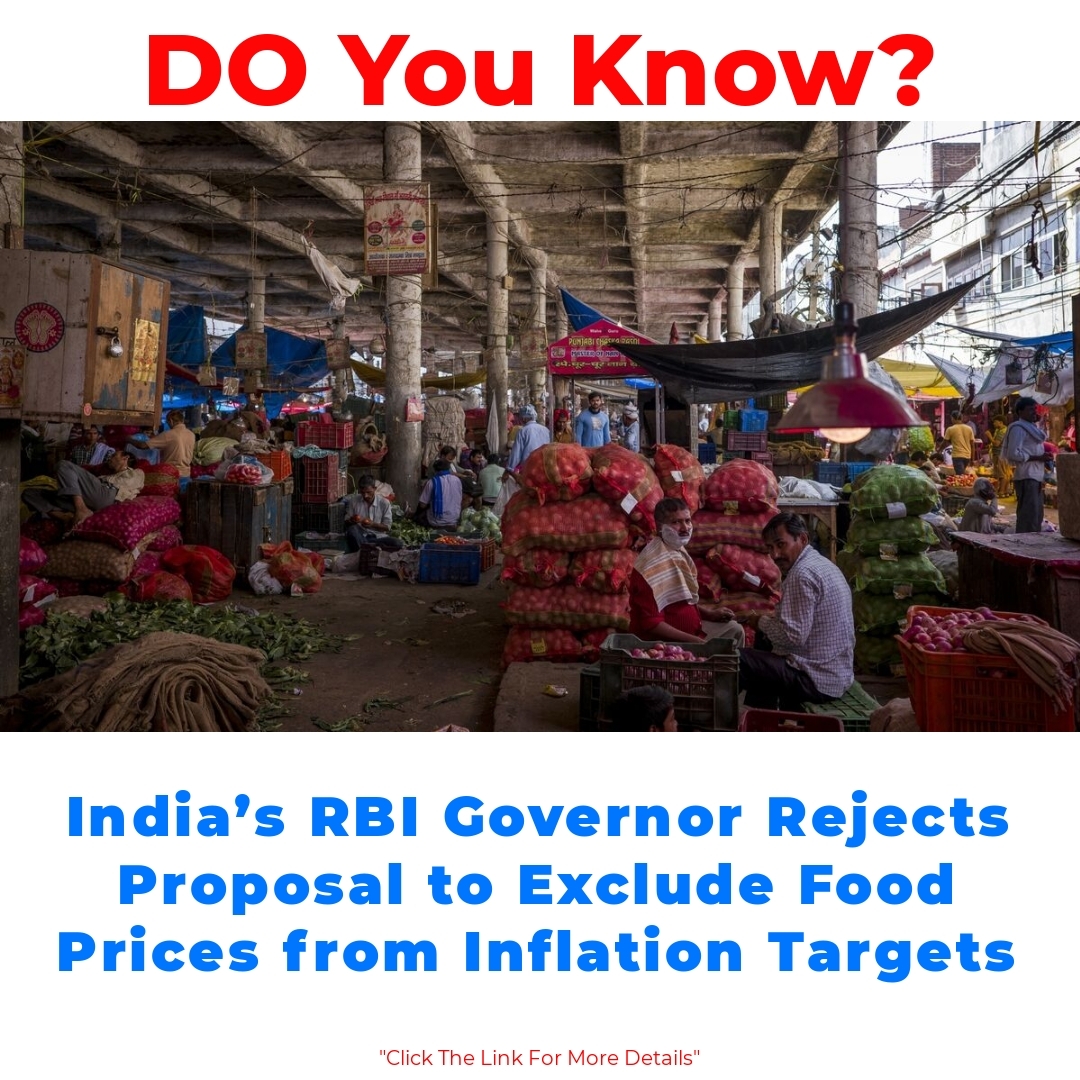The inflation landscape in India remains a pressing concern. Recently, Shaktikanta Das, the Governor of the Reserve Bank of India (RBI), addressed the debate around inflation targets and the proposal from a leading government adviser to exclude volatile food prices from these metrics, highlighting potential economic implications.

Understanding Inflation Targets
Inflation targets play a crucial role in a country’s monetary policy. Essentially, these targets are the specific goals that central banks, like the Reserve Bank of India (RBI), set to keep inflation within a manageable range. This ensures price stability, which is vital for economic growth and consumer confidence. The RBI primarily relies on the consumer price index (CPI) to gauge inflation rates across various sectors, not just limited to everyday goods but also extending to services.
Food prices are a significant component of the CPI, reflecting how much households have to spend on essential items. Thus, the role of food prices can’t be understated when it comes to measuring overall consumer price stability.
Shaktikanta Das’s Stance on Food Prices
Shaktikanta Das has been quite clear in his stance regarding inflation targets. He firmly believes that food prices should not be excluded from inflation calculations. His argument hinges on the fact that food plays a fundamental role in the average consumer’s daily budget. Ignoring these prices might create a skewed view of the economic landscape.
Das mentioned several reasons for keeping food prices in the inflation equation. For one, food is a staple for the majority of the population, and fluctuations can heavily impact their spending behaviors. If we were to ignore such volatility, we risk overlooking the real pressures that consumers face in their day-to-day lives.
Volatile Food Prices and Their Impact on Inflation Targets
Let’s take a closer look at volatile food prices and how they affect overall inflation metrics. These prices can swing dramatically due to various factors, from weather conditions to supply chain disruptions. When food prices rise, consumers tend to cut back on spending in other areas, which can lead to a decrease in overall demand within the economy.
Notably, there is a correlation between rising food prices and increased inflation rates. Data from previous years illustrate that spikes in food costs often lead to a broader inflationary trend affecting many sectors, further validating Shaktikanta Das’s views on the necessity of including food prices in inflation targets.
The Role of RBI in Monetary Policy
The Reserve Bank of India plays a pivotal role in sustaining price stability in the country. Its responsibilities also include managing inflation through various monetary policy tools. One key aspect of this involves monitoring the fluctuations in food prices and adjusting policy measures to mitigate any adverse economic effects.
Historically, the RBI has adjusted its monetary policy based on trends observed in food inflation. For instance, when food prices spike, the RBI may choose to hike interest rates to curb inflationary pressures. This is a balancing act, as they aim to control inflation while also encouraging economic growth.
Implications of Excluding Food Prices from Inflation Metrics
If food prices were to be excluded from inflation targets, the implications for fiscal policy could be significant. Policymakers may find themselves operating with an unrealistic picture of the economic environment. This could lead to misguided decisions regarding interest rates, government spending, and investments.
Additionally, excluding volatile food prices from inflation metrics could alter the consumer prices index. Economic planning in India relies heavily on accurate data, and any inaccuracies could affect not just growth forecasts but also the livelihoods of ordinary citizens. Economic experts have voiced concerns that such a move might create more challenges in the long run than it solves.
Conclusion
In conclusion, Shaktikanta Das’s argument surrounding inflation targets underscores the importance of including food prices in the inflation metrics. Considering food prices is vital for painting an accurate picture of economic health and consumer well-being. Policymakers must take these insights seriously, as they could ultimately affect the day-to-day lives of average consumers in India.
The inclusion of food prices in inflation measurements is not just a number-crunching exercise; it’s about ensuring stability and sustainability for economic growth in the country. It’s time for decision-makers to reflect on how crucial these insights are for the future of India’s economy.
What are inflation targets?
Inflation targets are specific goals set by central banks, like the Reserve Bank of India (RBI), to maintain inflation within a manageable range. This helps ensure price stability, which is essential for economic growth and consumer confidence.
Why are food prices included in inflation targets?
Food prices are included in inflation calculations because they form a significant part of the consumer price index (CPI), which measures overall inflation. Ignoring food prices could give a misleading picture of economic conditions since food is a daily necessity for most people.
What is Shaktikanta Das’s view on food prices?
Shaktikanta Das strongly believes that food prices should not be excluded from inflation metrics. He argues that fluctuations in food prices directly affect consumers’ spending behaviors and overall economic stability.
How do volatile food prices affect inflation?
- Volatile food prices can lead to changes in overall inflation rates.
- When food prices rise, consumers are likely to reduce spending in other areas, which can lower overall demand.
- Historical data shows a correlation between rising food prices and increased inflation rates across many sectors.
What role does the RBI play in managing inflation?
The RBI is responsible for maintaining price stability in the country, primarily through monetary policy tools. The bank monitors food price fluctuations and adjusts its policies, such as interest rates, to control inflation while supporting economic growth.
What are the risks of excluding food prices from inflation metrics?
- Excluding food prices could provide an inaccurate picture of the economy, leading to poor fiscal policy decisions.
- This could affect interest rates, government spending, and investment plans.
- Inaccurate inflation data could impact growth forecasts and the livelihoods of ordinary citizens.





